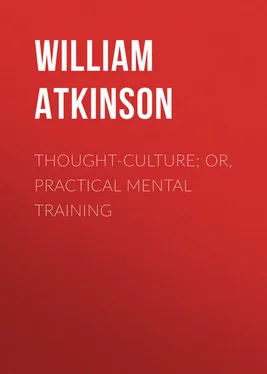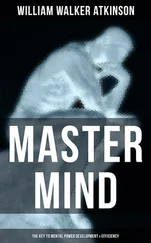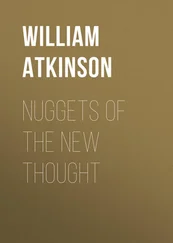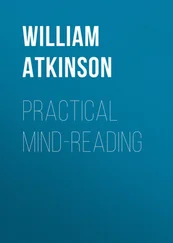William Atkinson - Thought-Culture; Or, Practical Mental Training
Здесь есть возможность читать онлайн «William Atkinson - Thought-Culture; Or, Practical Mental Training» — ознакомительный отрывок электронной книги совершенно бесплатно, а после прочтения отрывка купить полную версию. В некоторых случаях можно слушать аудио, скачать через торрент в формате fb2 и присутствует краткое содержание. ISBN: , Жанр: foreign_antique, foreign_prose, на английском языке. Описание произведения, (предисловие) а так же отзывы посетителей доступны на портале библиотеки ЛибКат.
- Название:Thought-Culture; Or, Practical Mental Training
- Автор:
- Жанр:
- Год:неизвестен
- ISBN:http://www.gutenberg.org/ebooks/41519
- Рейтинг книги:4 / 5. Голосов: 1
-
Избранное:Добавить в избранное
- Отзывы:
-
Ваша оценка:
- 80
- 1
- 2
- 3
- 4
- 5
Thought-Culture; Or, Practical Mental Training: краткое содержание, описание и аннотация
Предлагаем к чтению аннотацию, описание, краткое содержание или предисловие (зависит от того, что написал сам автор книги «Thought-Culture; Or, Practical Mental Training»). Если вы не нашли необходимую информацию о книге — напишите в комментариях, мы постараемся отыскать её.
Thought-Culture; Or, Practical Mental Training — читать онлайн ознакомительный отрывок
Ниже представлен текст книги, разбитый по страницам. Система сохранения места последней прочитанной страницы, позволяет с удобством читать онлайн бесплатно книгу «Thought-Culture; Or, Practical Mental Training», без необходимости каждый раз заново искать на чём Вы остановились. Поставьте закладку, и сможете в любой момент перейти на страницу, на которой закончили чтение.
Интервал:
Закладка:
II. Not only are the brain-cells developed by exercise, but it also appears to be a fact that the mind appears actually to be nourished by knowledge of the outside world of things. The raw material of thought is taken into the mind and there is digested by the thought-processes, and is afterward actually assimilated by the mind in a manner strikingly similar to the processes of the physical organs of nutrition. A mind to be at its best must be supplied with a normal amount of mental nourishment. Lacking this, it tends to become weak and inefficient. And, likewise, if its owner is a mental glutton and furnishes too much nourishment, particularly of a rich kind, there is a tendency toward "mental dyspepsia" and indigestion – the mind, unable to assimilate the mental food furnished it, is inclined to rebel. Moreover, if the mind be supplied with mental food of only one kind – if the mind is confined to one narrow field of thought – it weakens and the mental processes become impaired. In many ways is this curious analogy apparent.
Not only does the mind need development, but it also needs intelligent cultivation. For it may be developed by improper objects of thought just as well as by the proper ones. A rich field will grow tares and weeds as well as good grain or fruit. Thought-culture should not be confined to the development of a strong and active mind , but should be also extended to the cultivation of a wise and intelligent mind . Strength and Wisdom should be combined. Moreover there should be sought a harmonious and normal development. A one-sided, mental development is apt to produce a "crank," while a development in unhealthy mental fields will produce an abnormal thinker tending dangerously near to the line of insanity. Some "one-idea" men have great mental power and development, but are nevertheless unbalanced and impractical. And insane persons often have strongly developed minds – developed abnormally.
Some authorities, holding special theories regarding the nature of mind, hold that Thought-Culture is merely a training of the faculties rather than a creation of new mental power, inasmuch as the mind cannot be built up from the outside. This is a curious combination of truth and error. It is true that the mind cannot be built up from outside material, in the sense of creating new mind , but it is also true that in every mind there is the potentiality of growth and development. Just as the future oak is said to be in the acorn, so are the potentialities of mind-growth in every mind waiting for nourishment from outside and the proper cultivation. Brooks has well stated this, as follows: "The culture of the mind is not creative in its character; its object is to develop existing possibilities into realities. The mind possesses innate powers which may be awakened into a natural activity. The design of culture is to aid nature in improving the powers she has given. No new power can be created by culture; we can increase the activity of these powers, but cannot develop any new activities. Through these activities new ideas and thoughts may be developed, and the sum of human knowledge increased; but this is accomplished by a high activity of the natural powers with which the mind is endowed, and not by the culture of new powers. The profound philosopher uses the same faculties that the little child is developing in the games of the nursery. The object of culture is to arouse the powers which nature has given us into a normal activity and to stimulate and guide them in their unfolding."
In connection with the objection above mentioned, it may be said that while the development of the mind must come from within itself, rather than from without, nevertheless, in order to develop, it must have the nourishing material from the outside world in order to grow. Just as the body can grow from within only by the aid of nourishment from outside, so the mind, while growing from within, needs the material for thought which can come only from without itself. Thought requires "things" upon which to exercise itself – and upon which it is nourished. Without these outside objects, it can have no exercise and can receive no nourishment. Thought consists in the perception, examination and comparison of things , and the consequent building up new combinations, arrangements and syntheses. Therefore, the perceptive faculties are most necessary to Thought, and their culture is most necessary in the general work of Thought-Culture.
It must not be lost sight of that in Thought-Culture there is necessary a variety of exercises and forms of nourishment. What will develop one faculty will exert but a faint effect upon others. Each needs its own particular kind of exercise – each its particular kind of mental nourishment. While it is true that there is a certain benefit gained by the entire mind from an exercise of any of its parts, this effect is but secondary in importance. A man well developed mentally has been developed in each faculty, each in its own way. The faculty of perception requires objects of perception; the faculty of imagination requires objects of imagination; the faculty of reasoning requires objects of reasoning; and so on, each requiring objects of exercise and nourishment of its own kind – in its own class. In some persons some of the faculties are well developed while others are deficient. It follows that in such a case the weak faculties should be developed first, that they be brought up to the general standard. Then a further general development may be undertaken if desired. Moreover, in general development, it will be found that certain faculties will respond more readily to the cultivation given, while others will be slow to respond. In such cases wisdom dictates that a greater degree of exercise and nourishment be given to the slower and less responsible faculties, while the more responsive be given but a lighter development. In Thought-Culture as in physical culture, the less developed and slower responding parts should be given special attention.
In the following chapters we shall point out the methods and exercises calculated to develop the several faculties of the mind to the best advantage, in each case giving general advice along the lines of the cultivation of the particular faculty which will serve as general instruction regarding its culture. The student should carefully study the entire work before he attempts to specialize in the development of any particular faculty. The particular work may be aided by an acquaintance with the entire field of Thought-Culture for many of the faculties shade into each other in their activities and are always more or less interdependent. For, be it remembered, the mind is a whole , and not a mere aggregation of many parts. To understand the parts, one must study the whole – to understand the whole, one must study the parts.
CHAPTER V
ATTENTION
Attention is not a faculty of the mind in the same sense as perception, abstraction, judgment, etc., but is rather in the nature of an act of will concerned in the focusing of the consciousness upon some object of thought presented or represented to the mind. In some respects it bears a resemblance to Abstraction, inasmuch as it sets aside some particular object for the consideration of the consciousness, to the exclusion of other objects. Wayland explains attention as a condition of mind in which the consciousness is excited and directed by an act of the will. Hamilton says: "Consciousness may be compared to a telescope; Attention is the pulling out and pressing in of the tubes in accommodating the focus of the eye;" and also that: "An act of attention, that is an act of concentration, seems thus necessary to every exertion of consciousness, as a certain contraction of the pupil is requisite to every exertion of vision… Attention then is to consciousness what the contraction of the pupil is to sight, or to the eye of the mind what the microscope or telescope is to the bodily eye… It constitutes the better half of all intellectual power."
Читать дальшеИнтервал:
Закладка:
Похожие книги на «Thought-Culture; Or, Practical Mental Training»
Представляем Вашему вниманию похожие книги на «Thought-Culture; Or, Practical Mental Training» списком для выбора. Мы отобрали схожую по названию и смыслу литературу в надежде предоставить читателям больше вариантов отыскать новые, интересные, ещё непрочитанные произведения.
Обсуждение, отзывы о книге «Thought-Culture; Or, Practical Mental Training» и просто собственные мнения читателей. Оставьте ваши комментарии, напишите, что Вы думаете о произведении, его смысле или главных героях. Укажите что конкретно понравилось, а что нет, и почему Вы так считаете.












